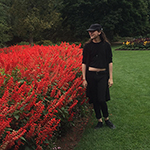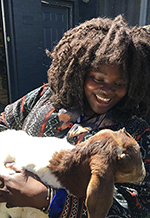A. Light Zachary - Poetry Judge
 Malahat Review volunteer Lauren Korn talks with the Open Season Awards poetry judge about their editorial work, writing a poem vs. an essay, and the value of simple truths expressed in new ways.
Malahat Review volunteer Lauren Korn talks with the Open Season Awards poetry judge about their editorial work, writing a poem vs. an essay, and the value of simple truths expressed in new ways.
LK: As a judge, what will you be looking for in the contest’s prize-winning poetry? As a reader, what makes you cringe?
ALZ: I feel exhausted by poems which presume to know a great deal about the world and speak in sweeping generalities upon The State Of Things, or which otherwise appear to be written from a perspective of intellectual superiority. I am most drawn to new ways in which simple truths can be expressed.
Read the rest of Light's interview on our website.
Francesca Ekwuyasi - Fiction Judge
 Malahat Review volunteer Paul Monfette talks with the Open Season Awards fiction judge about stories that linger in your psyche, using themes as writing prompts, and prioritizing reading the works of Black Femmes.
Malahat Review volunteer Paul Monfette talks with the Open Season Awards fiction judge about stories that linger in your psyche, using themes as writing prompts, and prioritizing reading the works of Black Femmes.
PM: Sometimes I gear my writing toward a particular contest I am entering. Do you ever write with a specific contest in mind that you may be entering? What are you looking for in a winning entry for this contest?
FE: I tend to gear my writing more towards particular themes from lit journals rather than contests. I do this because themes can work as pretty brilliant writing prompts, and I love a good prompt. Whenever there's a contest I'm interested in, my main goal is to try and stay within the word limit as I tend to be a bit longwinded with my short stories!
For this contest, I'm looking to be moved. I want to feel something. I want to read alive sentences and feel viscerally immersed in the story. I'm interested in being haunted, not necessarily in a frightening way, but in the sense that the story lingers in my psyche long after I've finished reading.
Read the rest of Francesca's interview on our website.
Tess Liem - CNF Judge
 Malahat Review volunteer Brandon Teigland talks with the Open Season Awards creative nonfiction judge about restraint, trusting your reader, and exploring different modes of writing.
Malahat Review volunteer Brandon Teigland talks with the Open Season Awards creative nonfiction judge about restraint, trusting your reader, and exploring different modes of writing.
BT: What would you say your best attribute is as a writer? Will this attribute be what you’re looking for from the winning entry in your respective category?
TL: Without certainty, I would say I exercise a lot of restraint. This, of course, can be a shortcoming too because I delete a lot, or sometimes don’t even give a thought the chance to be expressed in writing. But I do think it is helpful, when you have to edit your own work, to be comfortable letting things go unsaid—to trust your reader and the words you keep in the final draft—or to be able to say I love this sentence or element, but it belongs in another piece. What I’ll be looking for is someone being themself, exploring a topic through a frame that belongs to them, because something like restraint or any other attribute that I might deem good can read so many different ways depending on the writer.
Read the rest of Tess's interview on our website.